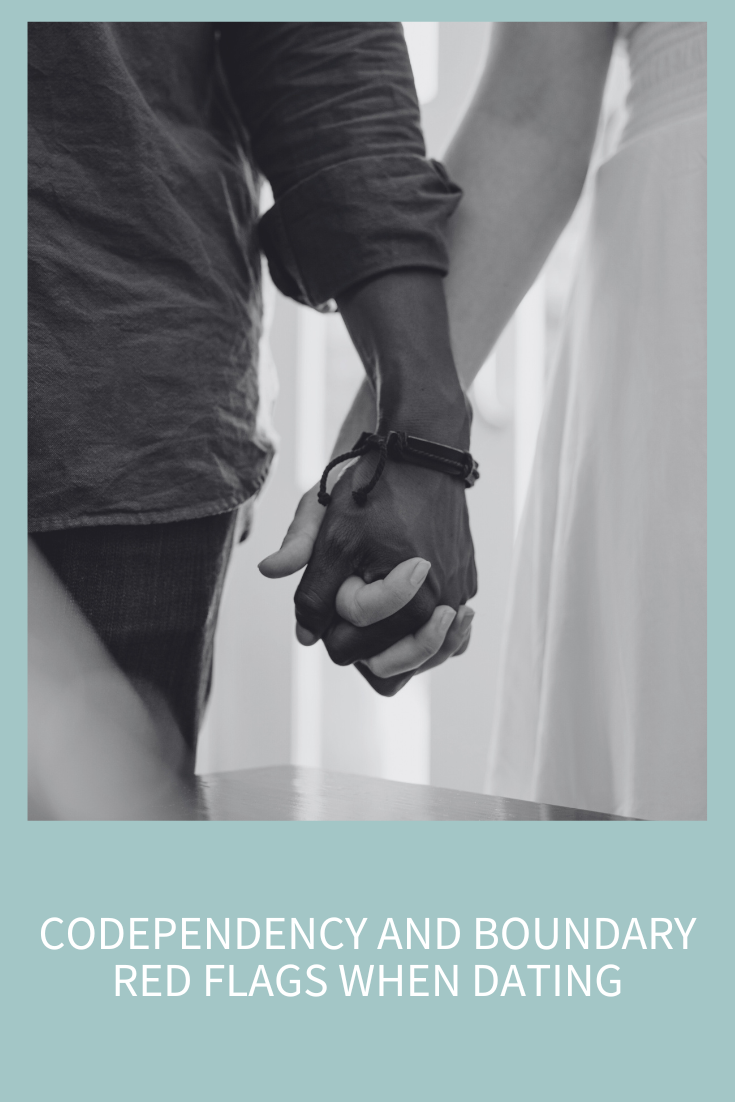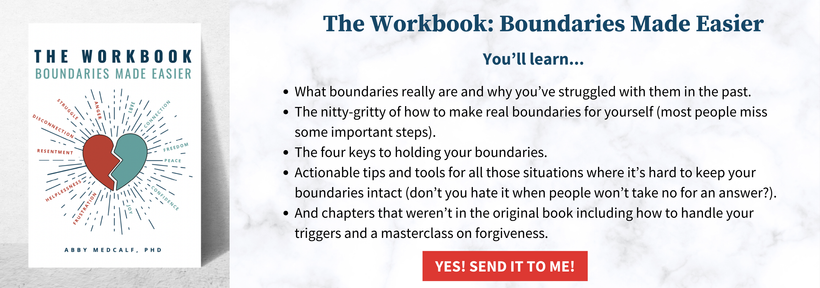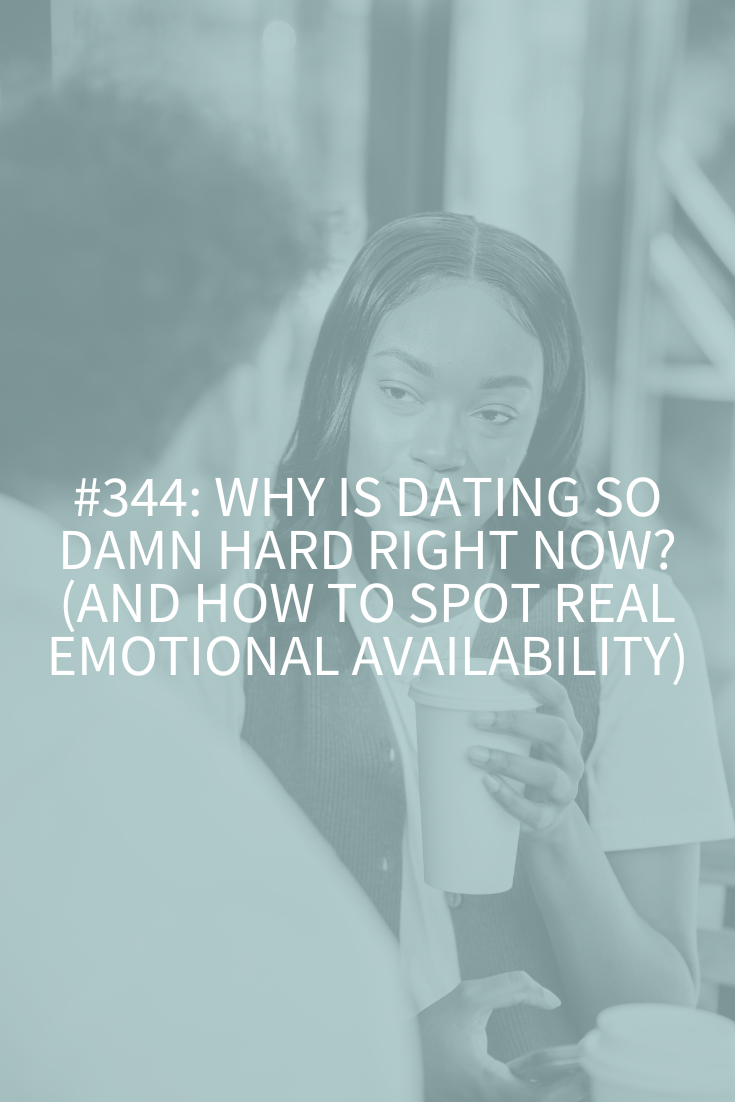
Dating should be exciting, filled with curiosity, fun, and a growing sense of connection. But if you’ve struggled with boundaries in the past or found yourself repeatedly in relationships that drain you, you might unknowingly be attracting (or being attracted to) codependent dynamics. Today we’ll break down what codependency looks like in dating, how to spot red flags early (before you’re in too deep), and the subtle ways someone might be trampling your boundaries that you shouldn’t ignore. You’re going to learn actionable tools to create healthier connections, build confidence in your boundaries, and avoid relationships that pull you into an unhealthy cycle of over-giving, rescuing, or feeling responsible for someone else’s happiness.
11-minute read
Understanding Codependency
Before we dive into red flags, let’s clarify what codependency actually is. Codependency isn’t just about being “clingy” or “needy.” At its core, it’s about a loss of self in relationships, where your sense of worth is tied to another person’s happiness, approval, or well-being (which is why you’re likely not speaking up when someone pushes your boundaries). It’s why you end up with people-pleasing, ignoring your own feelings or gut instincts, and worrying too much about what another person thinks instead of focusing on how they’re treating you.
I’m including an entire “playlist” of episodes at the end of this post. If you know that this is an issue for you, I highly recommend making those a priority to listen to or read. These include episodes on fawning, trauma bonding, how to stop people-pleasing, and more.
Note: Today, I’ll be shifting the narrative back and forth because it might be you who’s codependent in the relationship, it might be the other person or both.
Origins of Codependency
Codependent patterns often stem from early life experiences. If you grew up in a home where:
- You had to “earn” love by being helpful or self-sacrificing
- A parent or caregiver was emotionally unstable, unpredictable, or struggled with addiction or mental health issues
- You were rewarded for suppressing your own needs in favor of keeping the peace or
- You experienced trauma or adverse childhood experiences (ACEs)
… then codependency may feel familiar, even comfortable. But that doesn’t mean it’s healthy.
I have an amazing Masterclass bundle on this topic to help you figure out and overcome your core issues, which includes journaling prompts, a script library for hard conversations, a guided meditation to strengthen your boundaries when dating, a red flag tracker sheet, and more! If you’re a member of my online Patreon Community, the One Love Collective, these items are included in the different Tiers I offer. But if you don’t want to join, you can get everything for just $8. At the very end I’ll list all the things included so you can decide if it’s right for you. But, no matter what, I have an amazing free giveaway for you today: 25 Boundaries and Self-Worth Affirmations! You can find it below the video on YouTube or on my website, where you can find this episode on the podcast page or the Relationship Tips and Tools page.
The Consequences of Codependent Relationships
In dating, codependency can lead to:
- Feeling responsible for a partner’s emotions and actions
- Losing a sense of personal identity within the relationship
- Becoming overly reliant on external validation
- Ignoring or minimizing personal needs to maintain the relationship
If left unchecked, codependency can foster resentment, emotional exhaustion, and an imbalanced power dynamic, ultimately making it difficult to establish a truly healthy, reciprocal relationship.
How It Shows Up in Dating and Early on in Relationships
In dating or early phases of a relationship, codependency can manifest in ways that don’t immediately seem problematic, such as:
- Over-functioning: Feeling responsible for “helping” or “fixing” someone instead of focusing on mutual growth. You (or they) might even enjoy this and say things like, “It makes me feel so good to do for them.”
- Fear of conflict: Walking on eggshells or avoiding honest conversations to “keep things smooth” and/or to ensure they keep liking you.
- Losing yourself in the relationship: Prioritizing their needs, hobbies, or opinions while yours fade into the background.
- Constant reassurance-seeking: Feeling anxious if your partner doesn’t immediately validate you, text you back, or give you affection.
Left unchecked, these patterns can lead to unhealthy relationship dynamics where you’re doing all the emotional labor.
Three Codependency Red Flags in Dating Profiles & Early Conversations
Sometimes, the first hints of codependency show up in the most subtle ways, before you even meet in person. Here are three things to watch for in dating profiles or those early “getting to know you” chats:
1. Oversharing About Past Relationships or Personal Struggles
When someone spills their deepest wounds within the first few conversations, it’s not a sign of deep emotional connection; it’s a sign of blurred emotional boundaries.
Red flags to watch for:
- Trauma dumping: Sharing details of an ex’s betrayal, a painful childhood, or personal crises before any real trust has been established.
- Playing the victim role: A pattern of describing themselves as always being “used” or “hurt” in past relationships.
- Testing your empathy: Seeing how quickly you respond with comfort, advice, or reassurance.
2. The “Savior” or “Fixer” Mentality
Codependency thrives in dynamics where one person positions themselves as the rescuer. Some phrases that signal this in dating profiles or messages:
- “I just need someone who won’t give up on me.”
- “I’ve been through so much; most people can’t handle it.”
- “I want to take care of my partner completely.” (This might sound sweet, but it can indicate an unhealthy level of enmeshment.)
3. Love-Bombing or Affection Flooding Disguised as Enthusiasm
Back in episode 234, I taught you all about the seven stages of trauma bonding and, stage one, love bombing, is an area that gets a lot of attention. Love bombing is when, right away, you have a deep, intense connection with someone. Everything from the hours-long conversations to the sex is amazing! This is when one or both people are completely focused on winning the affection, attention, and love of the other person. There are often grand displays with extravagant dates or gifts.
A lot of times, love bombing is attached to narcissists or trauma. There’s a sinister character to the way it’s described as in, a narcissist will initially love bomb to “get you” but will then start gaslighting and trying to control you at every turn.
In all my years of experience, I’ve definitely seen love bombing like this, but there’s something else I see more commonly. It’s when someone is looking for validation from someone else, thus doing all the things that look like love bombing, but it’s from a lack of self-worth and codependency. It’s coming from a place of not feeling worthy of someone else’s love unless you’re doing for them.
“Affection Flooding” suggests that the codependent person is engulfing their partner with an avalanche of affection and attention, driven by their deep-seated need for validation and external affirmation. This can include those grand gestures like extravagant gifts, vacations, and saying “I love you” with a sky-writing plane, or always treating to great dinners and planning amazing dates. There’s still an intense and overwhelming experience, just like “Love Bombing,” but the root cause of the behavior is codependency.
The person is seeking excessive reassurance from their partner, flooding them with affection and attention to fill the void of low self-worth and an over-reliance on external sources for feeling good. These actions are driven by a deep-seated need for validation rather than a grandiose sense of self-importance seen in narcissistic love bombing.
So, there’s a difference between someone being genuinely excited about getting to know you and someone overwhelming you with intensity right away.
Watch for:
- Grand, sweeping statements early on (“I can already tell you’re different from anyone else I’ve met”).
- Possessive energy before commitment (“I don’t like the idea of you talking to other people on dating apps”).
- Quick escalation of intimacy (“I feel like I’ve known you forever” or “I can’t imagine my life without you” in the first few weeks).
Red Flags in Messages
Once conversations begin, you might notice additional warning signs of codependent tendencies.
- Constant Need for Validation: Someone who frequently asks questions like, “Do you think I’m a good person?” or “You’re not mad at me, right?” may struggle with self-worth and rely on external reassurance.
- Excessive Apologies or Self-Deprecation: If they apologize excessively for small things (“I’m sorry for texting you” or “I hope I’m not bothering you”), this could signal low self-esteem or fear of disapproval.
- Controlling or Manipulative Messaging: Watch for behaviors like:
- Getting upset if you don’t reply quickly
- Expecting constant check-ins or immediate responses
- Trying to make you feel guilty for setting boundaries (e.g., “I guess I’m just not important to you”)
Subtle Boundary Trampling You Shouldn’t Ignore
Sometimes, boundary violations don’t show up as dramatic red flags. Instead, they creep in subtly, in ways that are easy to dismiss, until they become overwhelming.
- Testing Your Availability
- They expect you to be instantly responsive to texts and seem frustrated if you take your time.
- They repeatedly “check in” on your whereabouts or plans, even before a relationship is official.
- Ignoring Small No’s
- You say you can’t talk right now, but they keep pushing.
- You mention needing personal space, and they joke about how you don’t really mean it.
- They show up at your workplace or home unannounced after you’ve told them you prefer planned visits.
- You’ve told them you need to leave by a certain time, but they push for you to stay later. Again, people often mistake this kind of behavior for a compliment (oooh, they like me), but it’s a warning, not a compliment.
- Making Their Emotions Your Responsibility
- They frequently say things like, “I just feel really off today… but don’t worry about me.”
- They subtly try to guilt you for not being as emotionally invested as they are yet.
- Their moods are unpredictable, and you find yourself constantly adjusting your behavior to keep them happy.
- Pushing for More Than You’re Comfortable With
- If someone keeps insisting on meeting sooner than you’re ready
- They press you for more personal details than you feel comfortable sharing
- They press for sex or more time with you when you’ve been clear that you need more time.
- Dismissing Your Preferences
- If you say you’re not a big texter, but they bombard you with messages anyway
- If they ignore when you express needing space
- Testing Your Limits
- They might say, “Oh come on, just this once” when you decline something, or “You don’t really mean that, do you?” when you assert a boundary.
These patterns might feel small at first, but over time, they chip away at your ability to maintain your boundaries, and that’s the real danger.
My Top Three Healthy Communication & Boundary Tools
Recognizing red flags is one thing; actually knowing what to do about them is another. As always, you’ve got to be mindful and aware in your moments that things are happening. This means you’ve got to keep up with your mindfulness practices. As part of this, please stop before any interaction (text, date, or call) and take a minute to make sure you’re off autopilot and aware in the present moment. In this way, you’ll better notice if anything is “off” that your autopilot might ignore.
Here are three actionable strategies you can take:
1. Set Boundaries and Expectations Early & Clearly
- If someone is texting constantly and expecting immediate responses, say:
“I love chatting with you, but I don’t check my phone all day. Just want to set that expectation now!” - If they push for deep emotional conversations too quickly:
“I really enjoy getting to know you, and I like to take my time with those kinds of talks.” - Follow through with your limits! If someone doesn’t respect your boundary, reaffirm it. If they continue, consider whether they’re a good fit for you. Do not give people multiple chances early on. Believe people when they show you who they are.
What I really want to focus on here is this: listen to your gut! Notice your feelings and trust them. For example, after speaking with them, take a beat, close your eyes, and check in with how you’re feeling. In my experience, people know there’s something “off” or fear-based, but they ignore it or don’t trust what their gut is telling them. That’s a huge mistake. If you keep ignoring your gut, you’ll continue to date this person and get more and more invested making it that much more difficult to end things later.
2. Watch for How They React to Boundaries
Someone with healthy relationship boundaries will respect them without taking it personally. Someone with codependent tendencies might:
- Get defensive or angry (“I guess you just don’t care as much as I do”).
- Push back (“I just don’t believe in playing games; I like to be all in”).
- Guilt-trip you (“I just feel like no one ever makes time for me”).
- Play the poor me card (“I can never find someone who really wants me.”).
If this happens, don’t rationalize it away! Trust what you’re seeing. Again, the free download I’m offering with this episode, 25 Boundaries and Self-Worth Affirmations, will help you when you feel yourself getting sucked into unhealthy dynamics/old patterns.
3. Prioritize Self-Check-Ins
Codependency thrives in relationships where you lose touch with yourself. Regularly ask:
- Am I over-functioning? (Am I taking on responsibilities that aren’t mine?)
- Am I sacrificing my own needs to keep the other person happy?
- Am I feeling anxious when I don’t get constant validation from them?
- How do I feel after conversations or time together?
- How do I feel when we’re apart?
If you notice these patterns creeping in, pull back and realign with your needs.
Resources for Codependency and Boundary Red Flags When Dating
25 Boundaries and Self-Worth Affirmations
Purchase the bundle for this episode for only $8!
Signs that Someone is Gaslighting You and What to Do About It
Your Playlist for Being a Healthy Dater and Partner
- Entitlement in Relationships: How to Recognize It and Break the Cycle
- Codependency, Counter-Dependency and Narcissism, Oh My!
- Is It Love Bombing or Codependent Affection Flooding?
- Are You Trauma Bonding in Your Relationships and Don’t Realize It?
- Your People-Pleasing Might Be a Trauma Response
- How to Stop People-Pleasing?
- How to Stop Rescuing and Start Supporting
- Boundaries Made Easy: Your Roadmap to Connection, Ease and Joy by Dr. Abby Medcalf
- The Workbook: Boundaries Made Easier by Dr. Abby Medcalf
For the One Love Collective Community:
Tier I:
- Journaling Prompts for Recognizing Codependency and Boundary Red Flags in Dating
- Is This a Red Flag or Am I Overthinking? Reflection Guide
Tier II:
- Red Flag Tracker Worksheet
- Script Library for Hard Conversations
- Voice Memo Challenge: Practicing Boundary-Setting
Tier III:
- Guided Meditation for Strengthening Boundaries in Dating
- Breaking the Pattern: Recognizing Boundary Violations in Past Relationships








